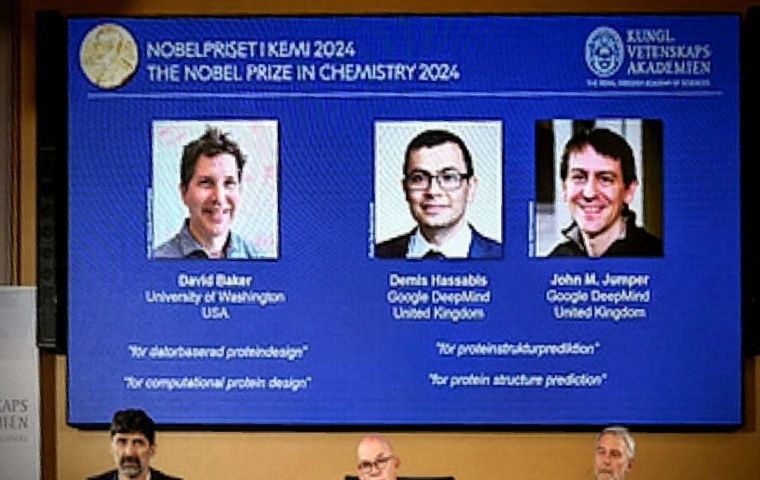MercoPress. South Atlantic News Agency
Proteins show the way for 2024 Nobel Chemistry Prize winners
 Proteins control and regulate all chemical reactions in the body's cells. Hence the importance of the two works recognized through Wednesday's awards
Proteins control and regulate all chemical reactions in the body's cells. Hence the importance of the two works recognized through Wednesday's awards Sweden's Royal Academy of Science announced Wednesday that researchers David Baker, Demis Hassabis, and John M. Jumper had been awarded the Nobel Prize in Chemistry for their studies regarding proteins.
Half of the € 970,000 award goes to the biochemist Baker for his “computer-aided protein design” while the other half is to be shared by Hassabis and Jumper, who developed in the UK an artificial intelligence (AI) protein structure prediction model. Both discoveries open up enormous possibilities, said Heiner Linke, Chairman of the Nobel Committee for Chemistry. “One of the discoveries being recognized this year concerns the construction of spectacular proteins. The other is about the fulfillment of a 50-year-old dream: the prediction of protein structures from their amino acid sequences,” he added.
Born in 1962, Baker is a professor at the University of Washington in his native Seattle who first created a new protein from amino acids in 2003. Since then, his research group has achieved the almost impossible feat of building completely new types of proteins that are used for pharmaceuticals and vaccines.
Hassabis, born in 1976 in London, and Jumper, born in 1985 in Little Rock, Arkansas, presented the AI model “AlphaFold2” in 2020, which can be used to predict the structures of practically all 200 million proteins known to date. The AI has been used by people in 190 different countries, the Nobel Committee explained. These discoveries can help researchers “better understand antibiotic resistance and create images of enzymes that can decompose plastic,” the committee said in a press release.
“They have cracked the code for the amazing structures of proteins,” the Swedish Nobel Foundation said Wednesday. Building new proteins and deciphering their three-dimensional structure makes innovative therapies possible because they control and regulate all chemical reactions in the body's cells, it was explained.
Hassabis, who was recently listed among the 100 most influential people in the world of AI by Time magazine, heads Google's AI subsidiary DeepMind where Jumper is a senior scientist.
This year's Nobel Prize winners for Literature and Peace will be announced on Thursday and Friday. The one in Economics to be announced next Monday is the only award not based on the will of the prize donor and dynamite inventor Alfred Nobel (1833-1896). The awards ceremony traditionally takes place on Dec. 10, the anniversary of Nobel's passing.




Top Comments
Disclaimer & comment rulesCommenting for this story is now closed.
If you have a Facebook account, become a fan and comment on our Facebook Page!